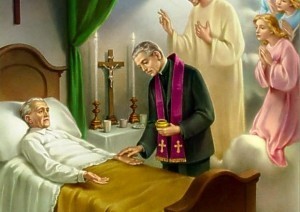“Is anyone among you sick? Let them call the elders of the church to pray over them and anoint them with oil in the name of the Lord. And the prayer offered in faith will make the sick person well; the Lord will raise them up. If they have sinned, they will be forgiven.”
James 5:14-15
If you or a loved one need Last Rites, please call and leave a message for Father Joseph at 870-929-6374. If you or a Catholic loved one in the area would like to be anointed, please contact the parish office at 479-253-2222.
The Sacrament of Anointing of the Sick is administered during periods of illness, in order to bring the person receiving it spiritual strength. The priest anoints the sick person with the “Oil of the Sick” (oleum infirmorum), a holy oil consecrated by the Bishop at the Chrism Mass on Holy Thursday. Anointing brings a deep intimacy with the suffering Christ. It also strengthens the soul with the power of Christ’s resurrection and the promise of one’s own resurrection. It’s common to make a Confession, if possible, before being anointed.
Anointing of the Sick is not necessarily the Last Rites. A priest may anoint any Christian upon request. A person may be anointed more than once, especially if they take a “turn for the worse.” The elderly can be anointed when the frailties of age or dementia begin to take their toll.
The Code of Canon Law provides that the last rites may be given to any Catholic disposed to receive them. They may also be given to baptized non-Catholics “who cannot approach a minister of their own community and who spontaneously ask for them, provided that they demonstrate the Catholic faith in respect of these sacraments and are properly disposed” (canon 844). If a sick person isn’t baptized, he can request baptism, which acts as “the gateway to the sacraments” (849). Canon law also adds, “The anointing of the sick is not to be conferred upon those who obstinately persist in a manifestly grave sin” (1007).
All of the final sacraments are repeatable. A sick person may request confession whenever he reasonably believes he is in need of it. He may request that Communion be brought to him either daily or weekly; if he is homebound, he ordinarily should respect the resources of the parish in distributing Communion to those who cannot attend Mass. Anointing of the sick may be given again if an illness worsens, or if a patient relapses after regaining his health.

